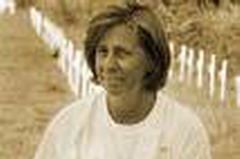'No more torture in our name': Sheehan, others march near Guantanamo
- Submitted by: admin
- Politics and Government
- 01 / 13 / 2007

By ANITA SNOW
Peace activists marched to the Cuban military zone wrapping around the U.S. naval base at Guantanamo Bay on Thursday, demanding the United States close its prison for terror suspects five years after the first detainees arrived.
The dozen protesters, including relatives of one prisoner and American "peace mom" Cindy Sheehan, walked along a lonesome, asphalt highway connecting the Cuban city of Guantanamo to the military zone. Sheehan wore a peace sign medallion around her neck.
"Gitmo prison is a source of shame, no more torture in our name!" the protesters chanted, holding signs saying "due process is overdue" and "there are no justice-free zones." The brother of British citizen Omar Deghayes carried a large color photograph of the detainee that read "justice for my brother."
It was not immediately clear how close the group would get to the base, where the U.S. military is holding about 395 men on suspicion of links to al-Qaida or the Taliban, including about 85 who have been cleared to be released or transferred to other countries. The military says it wants to charge 60 to 80 detainees and bring them to trial.
Critics say the camp, where most of the prisoners face indefinite incarceration, is an affront to democratic values. Abuse allegations have fueled worldwide outrage.
The military says the detention center is vital to the fight against terrorism and that instances of abuse have been investigated and the perpetrators disciplined. The detention camp commander, Adm. Harry B. Harris, says aggressive interrogation tactics are no longer used.
U.S. Army Col. Lora Tucker, a spokeswoman for the detention center, said the military had no plans to acknowledge the protest or increase security at the gate, which is located a distance away from the prison camp on the other side of a hill.
"Nothing changes for us based on a demonstration being held somewhere in Cuba," she said, adding that Thursday was "a normal work day" at the naval base with no special events planned to mark the anniversary.
The protest outside the base coincided with a demonstration of about 100 people in London outside the U.S. Embassy. Wearing orange, Guantanamo-style inmate outfits, the protesters formed eight long rows on a street near the embassy. Three "guards" wearing green camouflage outfits walked among them, shouting orders for them to stand up or kneel down.
In Cuba, the group planned to read the names of all the men still held at the prison.
Zohra Zewawi, the mother of British detainee Omar Deghayes, traveled from the United Arab Emirates with another son, Taher Deghayes, to join the protest. She says her son had been tortured and blinded in one eye since he was imprisoned in September 2002 and still has not been charged.
Also among the protesters was Asif Iqbal, a British Muslim detainee released two years ago whose story was featured in the film "The Road to Guantanamo."
On Wednesday evening, the activists screened the film for Guantanamo city residents, who largely resent the presence of the U.S. base, which the Cuban government considers a violation of the communist-run nation's sovereignty.
"Let's dream about closing down the base completely," protest organizer Medea Benjamin said before the screening of the movie, prompting a standing ovation by hundreds of Cubans at the event.
Sheehan, of Vacaville, Calif., became an anti-war activist after her 24-year-old son Casey was killed in Iraq. She drew international attention and was dubbed the "peace mom" after she camped outside of President Bush's Texas ranch.
The protesters held a daylong international conference Wednesday that featured members of their group and Cubans from Guantanamo, many of them high school and university teachers.
During the conference, Adele Welty, who lost her firefighter son in the Sept. 11, 2001, terror attacks, said she empathized with Zewawi and other mothers of men held at Guantanamo prison.
Of her son Timothy, Welty said, "I have been assured that it was over quickly, that he did not feel the tons of concrete that tore his body apart."
"But for five years, (the inmates') mothers have lived with the images of them being torn apart from torture," she said.
Source: Star Tribune
Comments